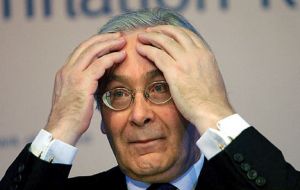MercoPress. South Atlantic News Agency
Bank of England warns about high inflation; rate won’t drop to 2% until mid 2012
 Mervyn King had to write the eighth letter in three years to explain “stubborn” inflation
Mervyn King had to write the eighth letter in three years to explain “stubborn” inflation The Governor of the Bank of England warned of the dangers of ‘destructive’ high inflation after admitting his surprise that the rise in the UK cost of living continues to overshoot targets, according to a report in the Daily Mail.
Invoking the specter of 1970s- and 1980s-style price rises, Mervyn King said inflation would remain above target until the end of next year due to the planned hike in the VAT rate. Policymakers would do whatever it takes to ensure that inflation does not run out of control and derail the economic recovery, he added.
The warnings came in King’s eighth letter to the Chancellor in three years to explain why the consumer price index remains stubbornly above the 2% target. Inflation nudged down from 3.2% in June to 3.1% last month, but stands well above the Bank’s mandated 2% threshold, according to official data.
The bank was ‘ready’ to put the inflation genie back in the bottle either by raising rates or withdrawing its scheme to inject £ 200billion of new cash into the economy, said King.
“We know from our experience in the 1970s and 1980s how destructive high inflation can be”. But the likelihood of borrowing costs rising before the middle of next year look remote as King stressed the one-off factors fuelling the prices rises, such as rising import costs and the planned VAT hike.
Britain’s recovery from its longest recession on record was also likely to be ‘muted’, meaning the consumer price index would drift back down to 2% by the middle of 2012, said King.
Striking a similarly cautious tone, Chancellor George Osborne hit back at suggestions that his savage public spending cuts were a high stakes move that could plunge Britain back into recession.
Osborne said: “The gamble would have been not to act, to put Britain’s reputation at risk, and to leave the stability of the economy to the vagaries of the bond market”.
Inflation fell to 3.1% in July with higher food bills keeping the cost of living well above the Bank of England's target. The Office for National Statistics (ONS) said food prices jumped 0.7% between June and July, the biggest monthly rise for two years, but falling petrol costs and second-hand car prices - in contrast with steep rises seen a year ago - meant that overall inflation eased.




Top Comments
Disclaimer & comment rulesCommenting for this story is now closed.
If you have a Facebook account, become a fan and comment on our Facebook Page!